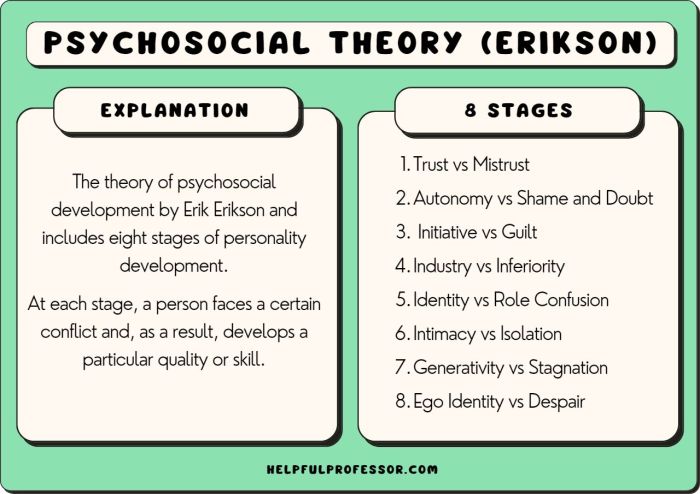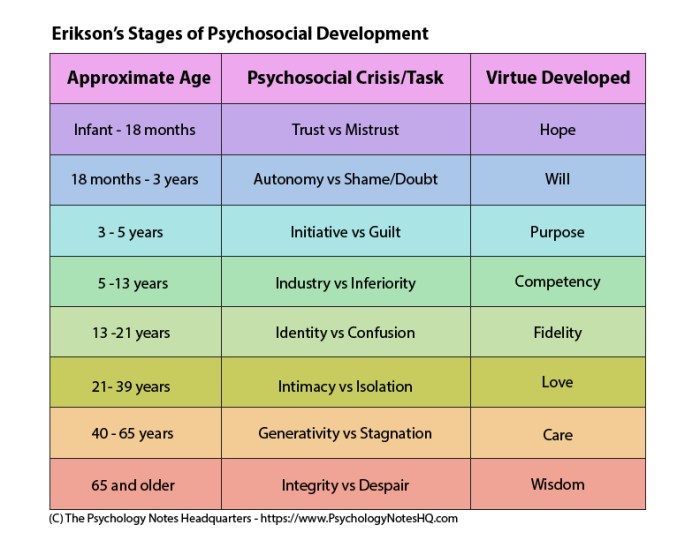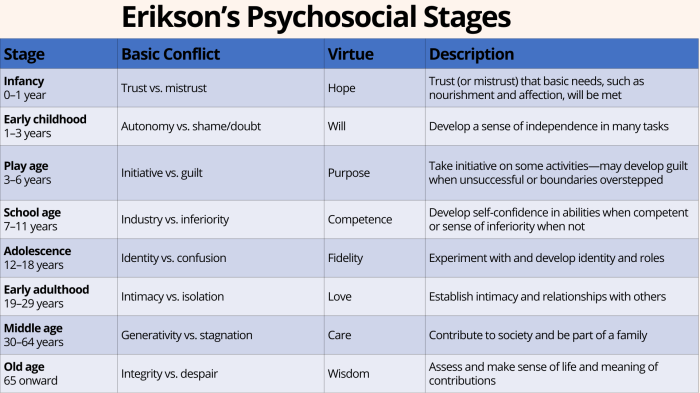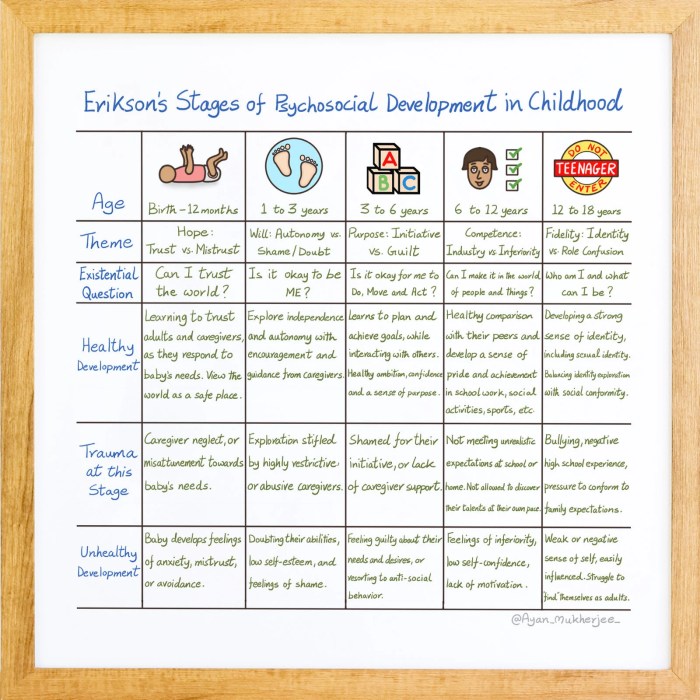Erik erikson 8 stages of psychosocial development worksheet – Erik Erikson’s theory of psychosocial development is a comprehensive framework that Artikels the stages of human development from infancy to late adulthood. Each stage presents unique developmental tasks and challenges, and successful navigation of these stages is essential for healthy psychological development.
This guide provides an in-depth exploration of Erikson’s 8 stages of psychosocial development, offering insights into the key concepts, developmental tasks, and challenges associated with each stage.
Erik Erikson’s Theory of Psychosocial Development: Erik Erikson 8 Stages Of Psychosocial Development Worksheet

Erik Erikson’s theory of psychosocial development proposes that individuals progress through eight distinct stages throughout their lifespan, each characterized by a unique developmental task and conflict. Successful resolution of each stage leads to the development of a healthy personality, while failure can result in negative outcomes.
Stage 1: Infancy (Trust vs. Mistrust)
During infancy, the developmental task is to establish a sense of trust in the world. This is primarily influenced by the quality of care provided by caregivers. Consistent, responsive care fosters trust, while inconsistent or neglectful care can lead to mistrust.
Stage 2: Early Childhood (Autonomy vs. Shame and Doubt)
In early childhood, the developmental task is to develop a sense of autonomy and independence. Children begin to assert their own will and explore their environment, seeking to control their actions and make choices. Parents can support autonomy by providing opportunities for self-expression and encouraging exploration within safe limits.
Failure to develop autonomy can lead to feelings of shame and doubt.
Stage 3: Play Age (Initiative vs. Guilt)
During the play age, the developmental task is to develop a sense of initiative and purpose. Children engage in imaginative play, explore their surroundings, and begin to take on more responsibilities. Parents can support initiative by encouraging curiosity, creativity, and a sense of accomplishment.
Failure to develop initiative can lead to feelings of guilt and inadequacy.
Stage 4: School Age (Industry vs. Inferiority)
In the school age, the developmental task is to develop a sense of industry and competence. Children begin to attend school, learn new skills, and compare themselves to peers. Parents and teachers can support industry by providing opportunities for achievement, recognition, and feedback.
Failure to develop industry can lead to feelings of inferiority and self-doubt.
Stage 5: Adolescence (Identity vs. Role Confusion)
During adolescence, the developmental task is to establish a sense of identity. Adolescents explore their values, beliefs, and future aspirations, seeking to define who they are and where they fit in. Parents and peers play a significant role in providing support and guidance during this time.
Failure to develop a clear identity can lead to role confusion and uncertainty.
Stage 6: Young Adulthood (Intimacy vs. Isolation)
In young adulthood, the developmental task is to develop intimate relationships with others. Individuals seek to establish close bonds with partners, friends, and family, and to form meaningful connections. Parents and mentors can support intimacy by providing opportunities for social interaction and emotional growth.
Failure to develop intimacy can lead to feelings of isolation and loneliness.
Stage 7: Adulthood (Generativity vs. Stagnation)
During adulthood, the developmental task is to contribute to society and raise a family. Individuals seek to find purpose and meaning in their work, relationships, and involvement in the community. Parents and society can support generativity by providing opportunities for service, mentorship, and leadership.
Failure to develop generativity can lead to feelings of stagnation and a lack of purpose.
Stage 8: Maturity (Integrity vs. Despair), Erik erikson 8 stages of psychosocial development worksheet
In maturity, the developmental task is to reflect on one’s life and achieve a sense of integrity and acceptance. Individuals come to terms with their accomplishments and failures, seeking to find meaning and purpose in their experiences. Parents and society can support integrity by providing a sense of belonging, respect, and opportunities for reflection.
Failure to develop integrity can lead to feelings of despair and regret.
Clarifying Questions
What are the key concepts of Erikson’s theory of psychosocial development?
Erikson’s theory emphasizes the importance of social interaction and experience in shaping personality development. Each stage of development is characterized by a specific developmental task and a conflict that must be resolved. Successful resolution of these conflicts leads to healthy development, while unsuccessful resolution can result in psychological problems.
What are the 8 stages of Erikson’s theory?
Erikson’s 8 stages of psychosocial development are: 1) Infancy (Trust vs. Mistrust), 2) Early Childhood (Autonomy vs. Shame and Doubt), 3) Play Age (Initiative vs. Guilt), 4) School Age (Industry vs. Inferiority), 5) Adolescence (Identity vs.
Role Confusion), 6) Young Adulthood (Intimacy vs. Isolation), 7) Adulthood (Generativity vs. Stagnation), and 8) Maturity (Integrity vs. Despair).
How does Erikson’s theory apply to real-world situations?
Erikson’s theory can be applied to a variety of real-world situations, such as understanding the challenges of adolescence, the importance of relationships in young adulthood, and the developmental tasks of adulthood and maturity. By understanding the developmental tasks and challenges associated with each stage, individuals can gain insights into their own development and the development of others.



